Mary McLaughlin murder: Killer jailed after DNA solves 35-year mystery
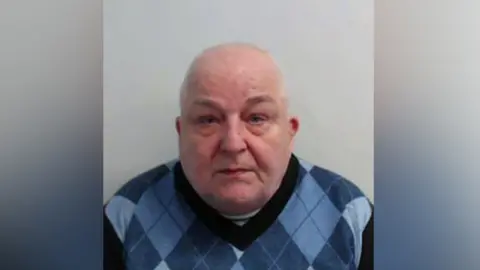 Police Scotland
Police ScotlandGraham McGill strangled Mary McLaughlin with her own dressing gown cord - and was back in his prison cell the morning after the murder.
Sex offender McGill was on the last night of temporary release from jail when he killed the mother-of-11 in her Glasgow flat.
Mary was found dead in her bedroom six days later, on 2 October 1984.
As a major investigation was launched, her killer was already locked up, less than 50 miles away in HMP Edinburgh.
By the end of the month McGill, who had just turned 23, was a free man with a dark secret.
It would be 35 years before a DNA breakthrough finally solved one of Scotland's most perplexing cold cases.
Now McGill - who still maintains his innocence - has been sentenced to a minimum of 14 years in jail after being found guilty of Mary's murder.
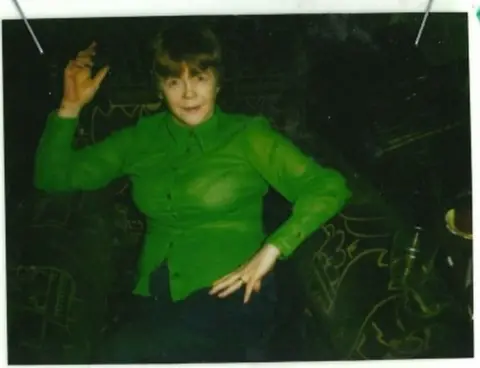 Crown Office
Crown OfficeMary McLaughlin spent her last night out drinking and playing dominos in the Hyndland Pub, now the Duck Club, which looks onto Mansfield Park in the west end of Glasgow.
It was 26 September 1984 and the 58-year-old was joined by one of her daughters.
Now aged 73, Catherin Mullen gave evidence during McGill's trial at the High Court in Glasgow. Asked if Mary was drunk, she replied: "She didn't act drunk - she was happy."
Catherine left the pub to catch a bus home - and never saw her mother again.
Mary was last seen leaving the bar, on Hyndland Street, at about 22:45 to walk less than a mile home to her Partick flat.
Along the way she called into Armando's chip shop on Dumbarton Road, where she joked with staff as she bought fritters and cigarettes.
David Seager, who knew her as Wee May, recalled that she walked in front of his taxi carrying her shoes in her hands.
During the trial he was also asked if he thought a man he saw standing outside a shoe shop was following her.
He replied: "Well yes. Every time Mary walked away he was always behind her."
The defence cast doubt on whether this was the accused, as Mr Seager did not mention the scar which runs from one of McGill's ears to his chin.
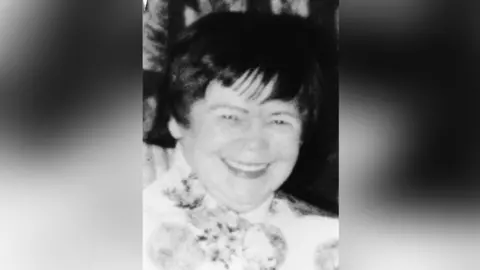
But what is certain is that a short time later McGill struck up a conversation with Mary and walked her back to the Crathie Court block on Laurel Street, where she lived alone.
Detectives said McGill was a stranger to the area and to a woman who was more than double his age.
Prosecutor Alex Prentice QC told the jury: "Mary McLaughlin was someone who was friendly and trusting and I would suggest that ultimately brought about her death."
Once inside the third-floor flat McGill launched what was described in court as a brutal, sexually motivated attack.
It ended with the grandmother being strangled and left lying on her back, covered with a green dress which had been put on back to front.
At the time McGill, who had been convicted of rape in 1981, was in the final weeks of a six-year sentence, which had been halved due to good behaviour.
BBC Scotland can reveal he was granted temporary release from HMP Edinburgh, as part of a training for freedom programme, on 21 September 1984.
McGill returned to prison on 27 September - just hours after leaving Mary's flat and using her keys to lock the door behind him.
In an era before mobile phones, Mary was not in frequent contact with her large family who lived in Glasgow, Lanarkshire and Ayrshire.
Once a week one of her sons, Martin Cullen, would call in to see her.
But when the then 24-year-old turned up at the flat on 2 October 1984, there was no answer and a "horrible smell" coming from inside.
Mr Cullen got a key from a neighbour but was still unable to get into the flat, so had to kick the door in.
His ex-partner went inside and came out screaming. Mr Mullen, now 60, told the jury: "My mum was dead."
A post-mortem examination concluded that Mary had died after being strangled at least five days earlier.
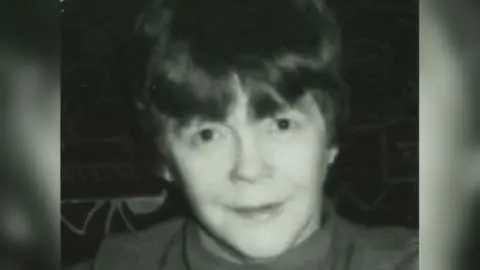 Crown Office
Crown OfficeThe key pillars of a modern murder investigation - DNA, CCTV, digital forensics and social media - were not available to detectives in 1984 and they had very little to work with.
There were no witnesses and, despite taking hundreds of statements, officers from the then Strathclyde Police were met with a poor response from the local community.
Forensic science was always going to be the key to unlocking the case, but by 2008 four separate reviews had failed to yield a profile of the suspect.
The fifth review was launched in 2014 and the eventual breakthrough was made possible by a new DNA-profiling facility at the Scottish Crime Campus in Gartcosh, North Lanarkshire.
Previously experts could look at 11 individual DNA markers but the latest technology was capable of identifying 24.
This dramatically increased the odds of scientists obtaining a result from smaller or lower-quality samples.
Tom Nelson, director of forensics for the Scottish Police Authority, said in 2015 that the technology would make it possible to "reach back in time, with the potential to rekindle justice for those who had all but given up hope".
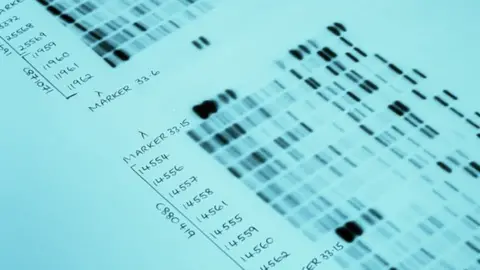 Science Photo Library
Science Photo LibraryAt the time of the murder experts only had very basic opportunities open to them, such as blood grouping and serum testing.
Forensic scientist Joanne Cochrane said: "One of the benefits of a case from that era is that often very little was done with the productions.
"They have been kept almost untouched for a number of years, which leaves us with quite a lot of opportunities to explore."
In Mary's case experts decided in 2019 to untie a knot in the ligature that had been tightened by the killer 35 years earlier.
This time they were able to take advantage of technology she described as "gold standard".
Ms Cochrane told the trial: "We felt that within the knot might be protected from contamination. We felt there was a possibility of retrieving DNA from within the knot.
"We did it very slowly... it was very difficult to unfasten."

Scotland's cold case convictions
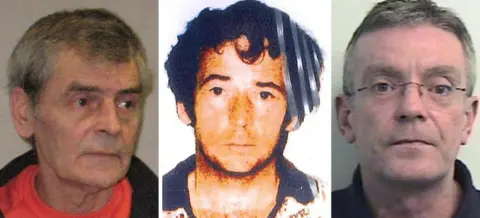 Police/Crown Office
Police/Crown OfficePeter Tobin was jailed in 2008 for the 1991 murder of Bathgate schoolgirl Vicky Hamilton. Her body was found in 2007, buried along with the remains of 18-year-old Dinah McNicol in the garden of Tobin's former home in Kent.
Angus Sinclair raped and strangled 17-year-olds Helen Scott and Christine Eadie after a night out at the World's End pub on Edinburgh's Royal Mile in 1977. He was jailed for a minimum of 37 years in 2014 after becoming the first person in Scotland to be tried for the same crime twice after a change in double jeopardy laws.
John Docherty murdered 16-year-old Elaine Doyle in Greenock as she made her way home from a nightclub in June 1986 - but he was not convicted until 2014. His case was the first to go to trial following an investigation by the Crown Office's cold case unit.

Previous examinations of the cord had only found Mary's DNA and a trace that was not possible to analyse.
But DNA24 analysis picked up a minor profile from the knot.
And when it was run through the Scottish database, police finally had a prime suspect.
The jury heard the likelihood of the forensic sample on the cord belonging to someone other than McGill was 85,000 to one.
Profiles were also found on a cigarette butt and on Mary's dress but this time the odds of it not being McGill soared to a billion to one.
A fourth sample was found on a black bra he took from the flat but which was later found in a nearby garden.
 Google
GoogleDet Supt Suzanne Chow said McGill was confused when officers finally turned up at his door on 4 December 2019.
She said: "He was quite tight lipped. You could tell he was shell-shocked and he probably wasn't expecting his past to come back and haunt him 35 years later."
At the time of his arrest he was still being managed as a sex offender, but was working in the Glasgow area as a fabricator for a company based in Linwood, Renfrewshire.
After McGill's conviction last month, the court heard he was also jailed for life in 1999 for a brutal assault with intent to ravish and released on licence in 2007.
'A real danger'
Det Supt Chow described McGill as "a sexual predator and a real danger to the public".
During the investigation Police Scotland's homicide governance review team trawled through his life and tracked down his ex-wife, Suzanne Russell.
She recalled a conversation from 1988 in which he confessed to killing a woman he met in a pub after going back to her flat.
But Ms Russell later told the jury that McGill threatened to kill her if she ever told anyone.
She added: "He said he strangled her and said he just wanted to know what it felt like to kill someone.
"He said he used her tights and said he was shocked how long it took to actually murder her."

WHO KILLED EMMA? Sam Poling investigates the brutal murder of Emma Caldwell
THE DOORSTEP MURDER: The murder of Alistair Wilson is one of Scotland’s most baffling unsolved cases

After three days of evidence, the jury in McGill's trial took just over two hours to return a unanimous guilty verdict.
On Tuesday, the 59-year-old was jailed for life and ordered to serve a minimum of 14 years in prison.
Lord Burns said McGill had murdered Mary after a "chance encounter", and that he had shown no remorse.
The judge added that Mary's family had been forced to wait more than 35 years to discover who was responsible for her death - knowing that whoever was responsible was probably still at large.
"They have never given up hope," he said.
After the sentence, Mary's son Martin Cullen said: "Hopefully he dies in jail."
Police believe the prosecution will now give hope to other families waiting for justice.
Det Supt Chow said: "These cases are not forgotten about. Just because they are not resolved at the time doesn't mean that we don't still think about these people who have been victims of crimes and that we don't think about their families."
She added that McGill's conviction also sends out a powerful message to other cold case killers.
"Your past doesn't go away. It will come back and haunt you one day."
